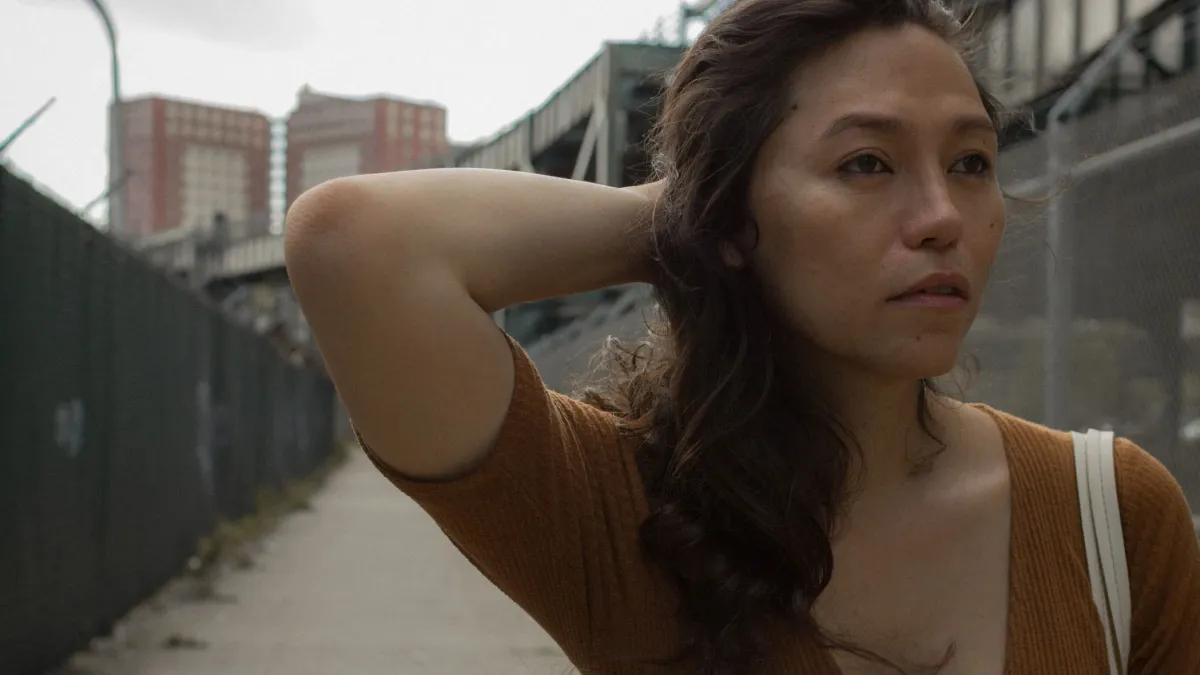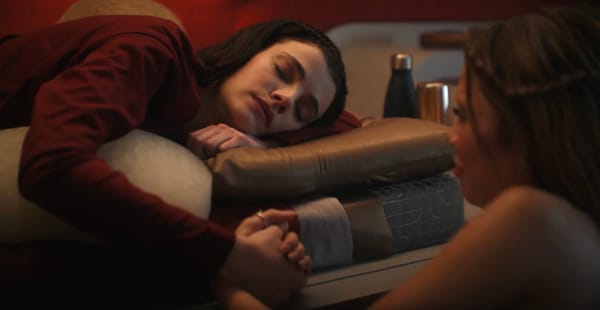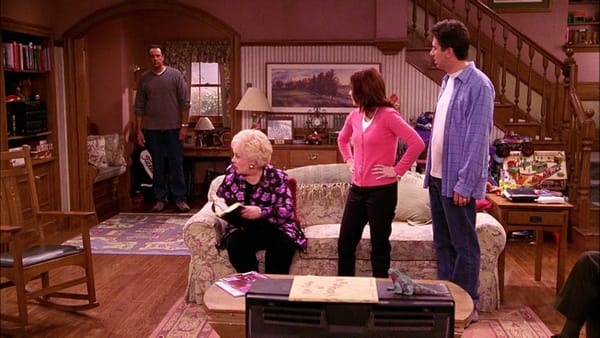Lingua Franca and the beauty of second chances
Isabel Sandoval's 2019 film about an undocumented immigrant shows new ways to tell trans stories.

(Each week, I’m publishing a new pop culture essay from a freelancer. Remember: Your subscription fee helps me pay these freelancers for their efforts! This week: Karina Solomon on Lingua Franca's portrayal of the intersections of the trans and immigrant experiences.)
My mother advised me to love with my eyes open. As someone with a record of dating people struggling with substance dependency, I unconsciously attracted partners who needed me in some capacity. Relating to someone healthy seemed impossible since the only way I knew how to connect with others was to rescue them.
And then I met Olivia.
Olivia is the protagonist of Lingua Franca, director Isabel Sandoval’s 2019 film about an undocumented trans Filipina immigrant who falls for Alex, a cis man and alcoholic with American citizenship who is struggling to stay sober. The two meet while she works as a live-in caretaker for his grandmother, Olga, who requires round-the-clock monitoring for her dementia.
Appropriately, given its title, Lingua Franca portrays an interracial queer romance between two souls who transcend their cultural barriers by connecting via English: a language they both speak. However, witnessing how the film captures the resilience of trans people in the face of repeated letdowns drew me to it.
Lingua Franca portrays transness as an intrinsic part of a storyline about getting multiple chances. It is a tale about the unique process a trans character undergoes to live more in alignment with her authentic self.
Sandoval (who wrote, directed, and stars as Olivia) created a trans protagonist making a living off of a low-risk under-the-table job rather than relying on the cliché of trans folks surviving by doing life-threatening sex work. Sandoval even chose an adorable, albeit sometimes feisty, elderly white Jewish lady as Olivia’s client, another deviation from the overused narrative of abusive relational dynamics between domestic workers and their employers. Olga’s relationship with Olivia is more kin-like than hierarchical. Because of the nature of Olivia’s work, she understands Olga like nobody else in Olga’s family does, emphasizing the presence of a sentimental value in the relationship that pays her bills.
In seeking ways to earn her US citizenship, Olivia pursues a business marriage, where undocumented Filipinos pay an American citizen to marry them so the undocumented person can get their papers. She feels fraught over her outdated Philippine passport, which lists her dead name and features a picture from before she transitioned. A conversation with her fellow trans immigrant friend, Trixie, highlights Olivia’s frustration with anti-immigration laws that enforce more rigorous crackdowns on undocumented immigrants, resulting in their go-to fake passport creator shutting down business out of fear of getting caught.
To overcome this hurdle, Trixie persuades Olivia to follow through with her business marriage to expedite her US naturalization application. She is again let down when the latest eligible bachelor she was doing business with backs out of his marriage proposal to wed another woman he fell for.

Trixie shines like a glimmer of hope for Olivia on Trixie's wedding day, which features a no-frills civil ceremony with a cis man with whom she genuinely fell in love. After the event, attended by a handful of guests, Olivia and Trixie take Polaroid shots as pairs. They are immortalizing memories of the wedding, with Olivia safekeeping these pictures in a photo book. She announces, “By the power vested in me, I now pronounce you husband and wife.” A full-frame shot of Olivia alone in her bedroom indicates her deep desire for a genuine partnership, capturing loneliness as the consequence of working as an overseas Filipino worker. She is momentarily taken out of her isolation when she parties with Trixie, as her best bud nudges her to wed yet another eligible bachelor as an antidote to her worries.
Enter Alex. To return a family favor, he volunteers to move into Olga’s apartment and help Olivia take care of her. He also agrees to work at a meat locker that his uncle manages. It becomes evident that he and Olivia are opposites, with Olga being the glue that eventually brings them together. Yet, Olivia chooses to remain the whole time she is flirting with Alex, even as he tries to hide his relapses to no avail.
Throughout the film, Sandoval features Olivia’s unglamorous lifestyle. Sandoval establishes her scenes via shots of the quiet, less gentrified Brooklyn streets during nighttime, the train platforms at dusk before rush hour, and Alex’s hazardous albeit artfully-filmed workplace. She focuses on Olivia and Trixie’s faces while chatting in a church or on Olivia and Alex driving around the city to run errands. She zeroes in on the pair’s flirtations in the most ordinary settings: a bar, the Atlantic City Boardwalk during off-peak hours, a sleazy motel with an in-room jacuzzi, and Olga’s modest apartment.
Sandoval adds to Olivia’s unpretentiousness via her wardrobe choices. Her appearance is low maintenance, challenging Barbie-esque, hyper-feminine, and flamboyant stereotypes dominant in mainstream media about trans women. She wears inconspicuous makeup, usually dons flats, and puts on minimal accessories to pair with her casual feminine outfits.
She never performs over-the-top femininity, as she is placed in environments where she isn’t pressured to do so. All these wardrobe choices and filming locations defy the status quo of how trans feminine people typically act and look when presented on screen.
The climax arrives when Alex discovers that Olivia is trans. It remains mysterious why she concealed her trans identity from him throughout their relationship. Was she trying to protect herself from him? Was it to secure her livelihood? Was she eventually going to come out to him when she felt safe enough to do so? He then plays a cruel trick on her, concocting an elaborate lie about ICE breaking into her bedroom and stealing her Philippine passport, even though he is hiding it from her the entire time.
Sandoval writes a toned-down ending to their relationship, one that expresses how Olivia handled her most heartbreaking letdown thus far: asking for her Philippine passport back from a man she trusted. He resists the breakup. Viewers catch scenes of him looking up ways to obtain a New York-state marriage license before apologizing to Olivia, then proposing to her as a desperate means to salvage their relationship.
The film ends with scenic shots of an abandoned Brooklyn, the snow now falling, the seasons passing. Viewers hear a voiceover of Olivia leaving a voicemail for her mother, sharing details about another bachelor she could potentially pay to elope and a new client she is caretaking. Undeterred by her breakup, she continues to pursue US citizenship under her true identity despite all the setbacks.
As a fellow queer immigrant who underwent the naturalization process for six years, I understand Olivia’s character choices and the situations she finds herself in. I hope to become more discerning of my relationships, just like how she walked away from Alex.
Episodes is published twice per week. Mondays alternate between a free edition on various topics and a subscriber-supported edition where I recap TV shows of interest. Fridays offer pop culture thoughts from freelance writers. The Friday edition and the biweekly recaps are only available to subscribers. Suggest topics for future installments via email or on Twitter. Read more of my work at Vox.



